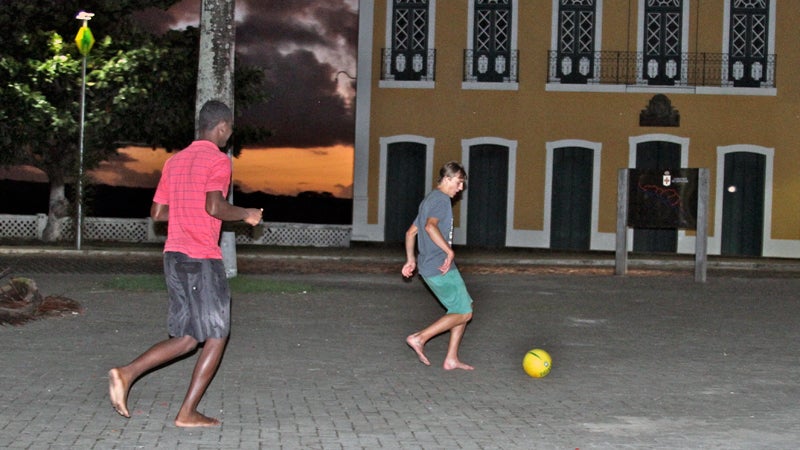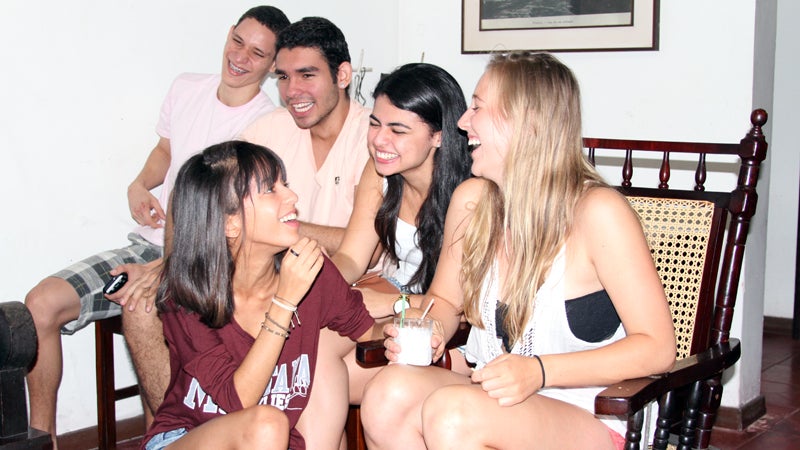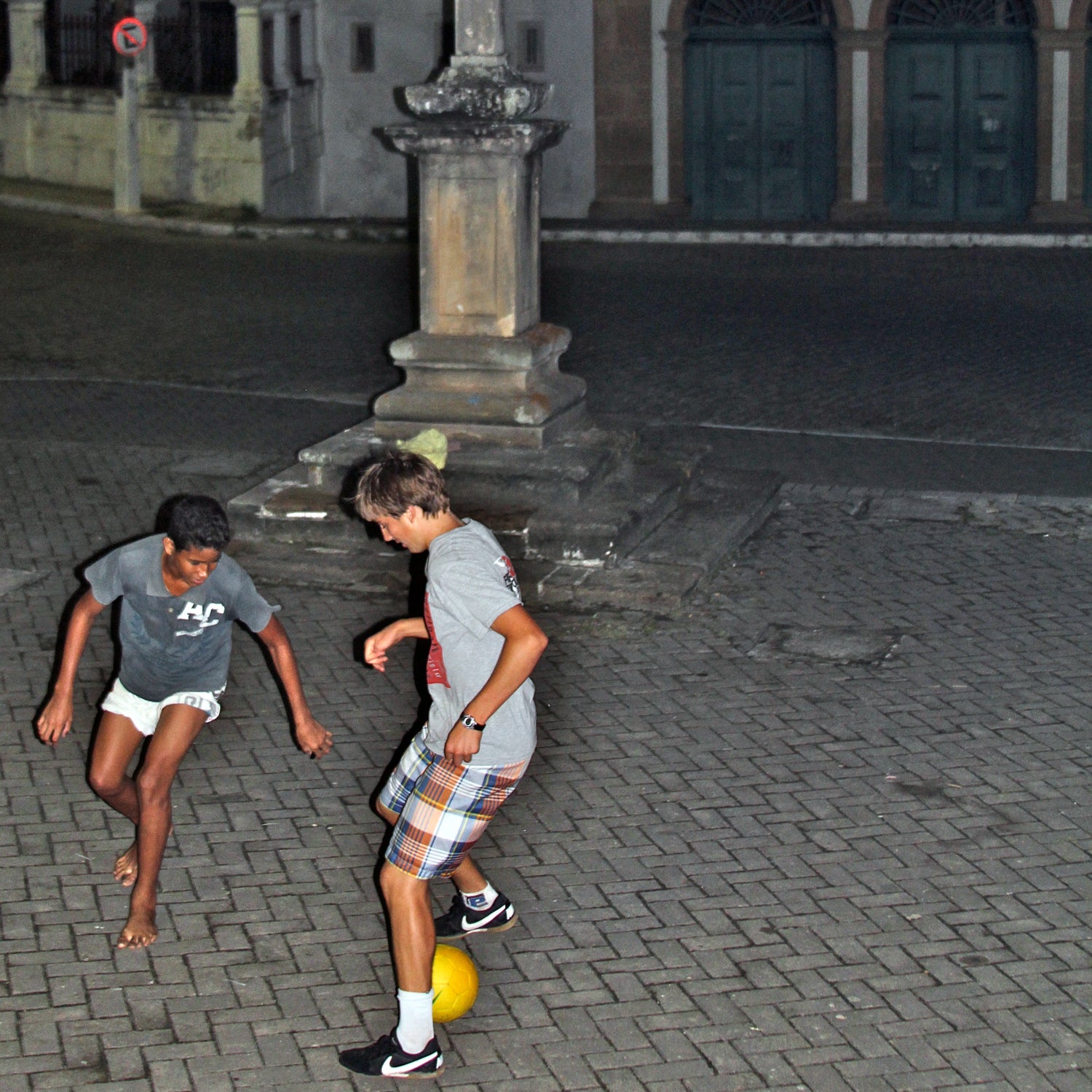“É nossa, é nossa,” “It’s ours,” our son Skyler shouted in Portuguese, laughing as he danced across the tiny plaza rolling the soccer ball forward, back, kicking it into the steps to ricochet into the goal delineated by two flip flops against the concrete retaining wall.
“Goooool!” he and Italo shouted, fists raised triumphantly in the air.
His old friend Victor gave him a friendly shove on the back; a good-to-see-you but how-did-you-get-another-goal type of shove.
We had finally arrived in Penedo, the town in the tiny state of Alagoas in Brazil, where we’d lived for a year, four years before.
Skyler was back at the Praça do Convento (the Plaza of the Convent), the site where he and Victor—the boy who had become Skyler’s best friend—first met, four years earlier when they were 12. The first night we’d arrived in Penedo, back in 2010, Skyler and our daughter Molly had joined a pick-up game of futsal, the lightening-fast version of soccer played on small, hard courts. This “court” was a favorite in the neighborhood. The Praça do Convento is a tiered plaza rising up from an 18th-century, white-plaster and carved-stone church. On the lowest tier of the plaza, the “court” is squeezed in between a set of steps, a couple of retaining walls, and a stone cross, leaving a patch of brick the size of a stamp. There’s a reason Brazilians are so good at footwork. They’ll kick a ball anywhere, regardless of the obstacles.

Here they were, same people, same place as four years before, doing just what they’d done then, but at a whole different skill level. Now they deftly use the stairs, the stone cross, the retaining walls to ricochet the ball around their opponents to their partner. Victor has grown to more than six feet tall and is filling out into a man. He’s as patient and quick as ever; his darting movement stopping a foot from the ball, waiting like a panther for the moment to swivel his feet and block his opponent’s shot or shoot in a foot and suck the ball away. They were playing two against two, Skyler, Victor, his older brother Italo, and whoever else happened by.
Though we’d arrived late, after dark, the night before, the first thing Skyler wanted to do was to run up the cobbled street to Vito’s blue plaster house. The rest of us, tired after an eight-hour day of bus and van travel from Salvador, had retreated to Oratorio, the airy restaurant cantilevered out over the Rio São Francisco. We’d happily installed ourselves on the hard wooden seats, ordered beans and rice, fried fish, beer, and caipirinhas. Skyler showed up 30 minutes later; despite all the challenges of his year in Brazil as a budding teenager, now at 16, he seemed thrilled to be back.
I’m a firm believer in living abroad with kids, as I had as a child myself. I’m convinced those experiences gave me the best parts of myself; the ability to adapt, the ability to connect to people unlike myself, and a wide-ranging curiosity about the world. But my experience living abroad at the age of 12 in the cosmopolitan, English-speaking city of Cairo was very different from Skyler’s experience, at 12, of living in the small town of Penedo. His experience was of total language immersion; of trying to fit into a highly competitive, macho soccer culture and navigate the mysteries of teen social life when he didn’t understand the cues and couldn’t speak the language.
As one of the parents in charge I’d been shaken. I had wondered whether the year was going to be worth all the frustration our kids were experiencing at times. In some ways this return felt like a test. So far it appeared my prediction had come true, that the hard parts would recede and the excitement of learning to live in a new place and acquire a new language would remain.
In the three years since we’d left, nothing had changed and everything had changed. The town appeared and felt much the same: strings of brightly colored, 19th-century houses, some newly painted, other’s faded, still climb up the ridge away from the wide, ambling river; brightly striped lanchas moored at its sandy banks still wait to ferry people across; music blaring from speakers mounted on motorcycles still bounces off plaster walls; the outdoor market, tented over with sheets of flimsy black plastic, is still covered in black plastic, although the renovation of the 19th-century market building next to it has been completed. The town has the same sluggish ease.
But in the meantime, the lives of our friends, the people who had so generously taken us in, have undergone lots of changes: marriages, divorces, births, deaths and imprisonment. Mostly, these are the changes that happen in the lives of people anywhere.

The friends of our daughter, Molly, at 19 and 20, are of the age to move to bigger cities, either to attend universities or live with relatives in search of better employment. Those who haven’t moved have started having babies. The week we showed up, her main crew returned in force to find her at the Pousada Colonial where we were staying.
“We missed you so much!” they exclaimed in Portuguese at high volume, proceeding to lure her out to passear (stroll) around town.
Each of the four of us immediately reconnected with our particular groups and the language we struggled so hard to acquire is flooding back in. My husband, Peter, is sliding seamlessly back into his pick-up soccer crowd on the tattered field, with the net-less goals by the river; and I am back in the roda, the sparring ring in Capoeira—an acrobatic Brazilian martial art/dance form—where I dodge the sweeping kicks of the Capoeiristas just as nervously as I did before.
There’s no question in my mind that these people will be our friends for life. They’re not necessarily the friends we would choose at home, where I, at least, mostly choose friends because of mutual interests. Though I guess here you could say we chose each other through mutual interest as well, but not an occupational or recreational interest, rather the interest in meeting the “other.” The people who befriended us were the ones who were interested in meeting someone different. We’d chosen to live abroad for the same reason. When I asked Skyler if he was happy to be back he said, “Yeah, I’m really happy,” or as a Brazilian would say, “Com certeza!” “Absolutely!”


